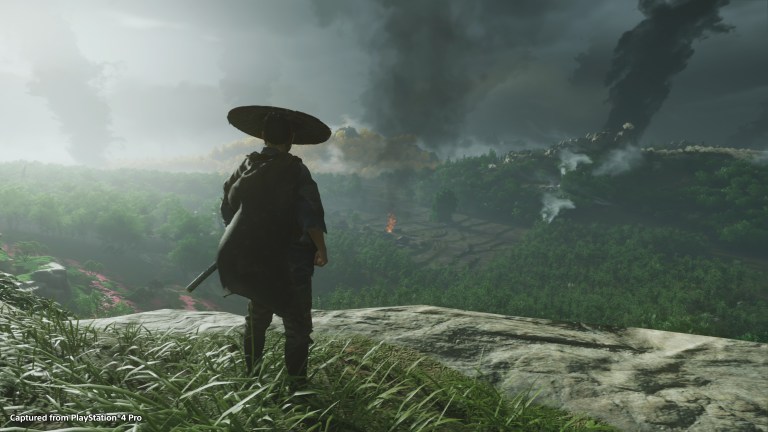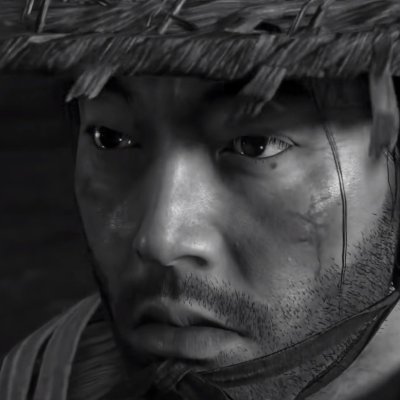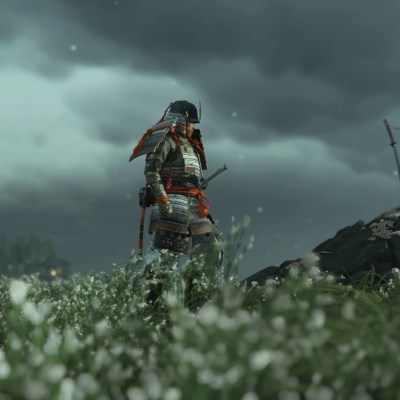Ghost of Tsushima Ending Explained
There's a lot going on in the Ghost of Tsushima endings. We break down their meaning here.

This Ghost of Tsushima article contains spoilers.
Ghost of Tsushima is as epic as the classic Akira Kurosawa movies that inspired it. And in the spirit of those movies, Jin Sakai’s long journey to free his homeland from the Khotun Khan and his Mongol army concludes in brutal fashion.
Main protagonist Jin goes through a lot, both internally and externally, on his journey, while wrestling with the traditional, samurai notion of “honor,” whether or not it’s worth dying for, and what honor is worth when innocent lives are on the line. Fittingly, the game’s finale sees Jin come face to face with two opponents who are ultimate representations of honor and dishonor.
Needless to say, there’s plenty to unpack in Ghost of Tsushima‘s final moments. I’m going to delve into the conclusion of Jin’s tale in-depth, exploring the complexities of his relationships and the repercussions of the tough decisions he’s faced with.
What does killing Khotun Khan really mean for Jin?
In the final battle scene of the main story, Jin and his allies Yuna, Sensei Ishikawa, Norio, Masako, and Kenji storm Khotun Khan and his army at Port Izumi, blowing the unsuspecting Mongols to bits with explosives and slashing what’s left of them to pieces, clearing a path for Jin to finally finish the one-on-one duel he and the Khan had at the beginning of the game.
Of course, the fight doesn’t wind up being a fair one because Khotun has no honor. Jin fights Khotun one-on-one for a while, but then the Khan retreats to his ship, where Jin must take the Mongol leader down as his armed cronies rain swords, spears, and fire arrows down on the Ghost’s head. When Jin finally defeats Khotun, the dying Mongol utters the words, “Kill me and another will come. We will be remembered.”
To this, Jin replies, “No. You will be forgotten,” before slicing Khotun’s head off of his gigantic shoulders. Killing the Khan doesn’t end the invasion — there are still Mongol encampments strewn all over Tsushima. But I believe Jin’s victory symbolizes something much deeper for him personally.
Throughout his journey, Jin has struggled with the nature of honor. It’s virtuous to fight enemies head-on, in a fair fight. But what if your enemy refuses to fight fair? Is it worth risking the lives of your people in the name of honor, or is it justifiable to use the art of deception to gain an unfair advantage against an enemy as unscrupulous as the Mongols?
In the context of Jin’s story, Khotun Khan represents what happens when a warrior succumbs completely to the allure of dishonor, or “the way of the Ghost.” When Jin tells the Khan he will be forgotten, he knows that because he’s taken up the ways of the Ghost himself. Jin will be forgotten, too. All of Jin’s sacrifices to save Tsushima will not be attributed to him or clan Sakai, but to the Ghost.
What is the significance of the peasant and his cart?
Shortly after Jin and Lord Shimura meet at their old sparring circle in Omi Village, they happen upon a peasant whose cart is stuck in the mud. He tells them he’s headed North to join the Ghost’s army and they help him get his cart back on dry ground. Lord Shimura even wishes him well, telling him to avoid Mongols.
Jin has no idea what the peasant is talking about — he hasn’t started an army. But Lord Shimura enlightens him, explaining that the figure known as Ghost has now taken on a life of its own. Jin’s actions as the Ghost — particularly his open defiance of Lord Shimura’s orders when they retook Castle Shimura from the Mongols — have encouraged the people of Tsushima to question their leaders in a way that dismantles the foundation of tradition that samurai and the shogun were built on. Essentially, Jin has sparked a revolution.
There’s a lot of foreshadowing going on here. As we later learn, Lord Shimura is leading Jin to a duel to the death, but as they help the peasant and discuss the repercussions of the manner in which Jin has chosen to fight the Mongols, it’s clear that Shimura harbors no anger toward his nephew. He still loves him, but he’s disappointed and mourns what they once had. They were meant to be father and son, but the fact of the matter is, Jin has undermined everything Shimura worked his life to defend and uphold, and what’s worse, he’s now inspired the people of Tsushima to follow suit.
Why does Lord Shimura fight Jin to the death?
At the Sakai family cemetery, Lord Shimura reveals to Jin that he’s been tasked by the shogun, who have branded Jin a traitor, to kill him. Jin believes that he’s inspired people to stand up for themselves, but in Lord Shimura’s eyes, there is only one way to lead one’s life: with honor. And because Jin has chosen to use dishonorable tactics to defend Tsushima, he must pay for his transgressions.
What this all boils down to is that Lord Shimura is so unshakably committed to honor and samurai code that he intends to kill his would-be adopted son in the name of it. He’s an honorable samurai, and he refuses to compromise. “You have no honor,” he scolds. “And you are a slave to it,” Jin retorts. This is the inevitable impasse that these two warriors, the last samurai of Tsushima, have arrived at.
There’s a generational aspect to this finale that resonates with the current sociopolitical state of the world as well. Lord Shimura is devoted to tradition to an almost fanatical extent. He represents an older generation who are in power and whose stubbornness and refusal to listen to reason in times of crisis cause them to risk innocent lives in the name of upholding the status quo and protecting archaic notions of right and wrong. Sound familiar?
Jin, of course, represents a younger generation that dares to challenge old ideas and who aren’t afraid to rail against tradition if it means finding a better way to protect their people. They aren’t afraid to call out their elders on their bullshit and take a progressive, evolved approach to leadership.
Remember: Despite Ghost of Tsushima being set in ancient Japan, Sucker Punch is an American developer. It likely isn’t a coincidence that Jin and Lord Shimura’s eternal debate over tradition vs. progressivism bears a resemblance to the elevated generational conflict that has gripped the US in recent years.
Are Lord Shimura and Jin father and son?
Despite Jin and Shimura’s irreconcilable differences, there’s one thing that’s crystal clear when watching them ride on their horses together through Omi Village: they still love each other. This is the tragedy at the center of the story. Because these men have chosen diverging paths, there is no longer a way for them to coexist at all. And yet, they are family and they care for each other deeply. It’s a paradoxical situation, but Shimura had tried his best to bring Jin back to his side of the fence.
Earlier in the story, Lord Shimura lovingly reveals to Jin that he’s publicly announced his intention to adopt Jin as his son, adding that he demands Jin stop using deceptive tactics in battle and face his enemies head-on (no matter the cost). But then Jin poisons a gaggle of Mongols at Castle Shimura, a spectacularly dishonorable display that saves the lives of countless Tsushima denizens and thoroughly embarrasses Lord Shimura in front of his new shogun buddies.
This act of defiance forces a rift between Jin and Shimura that seems insurmountable, and they never make the adoption official. But in their samurai showdown (sorry, had to) at the Sakai cemetery, they seem to still be referring to each other in familial terms, almost unmistakably like a father and son would. Actually, if you die during the boss fight, Shimura actually calls Jin “son” before sticking his katana in his spine. Brutal.
Technically, Shimura and Jin are not father and son by the end of the story. They’ve chosen separate paths and they will never walk side by side again. But at that moment, in their hearts, they are father and son through and through (this is reinforced even further depending on whether you choose to let Shimura live or not when you defeat him — more on that shortly). “Our final day together,” Shimura says moments before they cross swords. “It is beautiful.”
What is the meaning of the final haiku?
Before Jin and Shimura’s epic fight to the death, they each write down the final words of their respective clans in the form of haikus. As in all of the other haiku moments of respite in the game, you’re given three options to choose from for each of the three lines of the poem. The words are profound encapsulations of their fraught relationship over the years.
Line 1 options:
Eyes that saw my pain
Hands that shaped the world
Strength in every step
Line 2 options:
A fate neither of us want
Destiny divides our souls
A bond broken forever
Line 3 options:
I fight without hope
This is where we part
Will death redeem us?
The most intriguing option of all is, “Will death redeem us?” I believe Jin is being skeptical here, asking himself whether killing each other is the only course of action, as the shogun suggest, or if it’s all just a pointless, empty display of “honor” in the most antiquated sense. What’s the point of them fighting each other? Is it the right thing to do? Jin doesn’t think so.
Essentially, the haiku just reinforces how insanely depressing the characters’ predicament is. There’s a finality to Jin’s words, and the most heart-wrenching thing about the poem is that he has chosen to make the final words of the Sakai family a miserable breakup letter to/about his uncle, who isn’t even a Sakai!
What happens if you choose to spare Lord Shimura?
Once Lord Shimura is defeated, he requests that you grant him a warrior’s death. “Honor me,” he pleads. You are presented with a choice: You can either spare him, essentially spitting in the face of the ideals and philosophies Shimura dedicated his life to, or you can grant his wish and let him die on his own terms.
If you choose to spare his life, Jin stands tall above his beaten uncle and refuses to kill him. “I have no honor,” he says. “But I will not kill my family.” Shimura, heartbroken, tells his nephew that, “The Ghost will be hunted for the rest of his days,” to which Jin replies, “I know.”
Jin choosing to spare his uncle is the ultimate act of defiance. In his mind, he’s eschewing tradition and choosing to lead his life not by blindly following old traditions, but by carving his own path and thinking for himself. At the same time, he knows that his uncle doesn’t see it that way, and he knows quite well that he’s just denied his mentor his dying wish. This is heavy, heavy stuff.
Jin then puts on the Ghost mask and walks away. He knows that his defiance won’t come without a price. He’s giving up his life as a samurai and his relationship with his uncle to fight for his people in the way he sees fit. It’s a sacrifice he’s willing to make.
What happens if you kill Lord Shimura?
This is where things get really Shakespearean. If you choose to kill Shimura, Jin makes him a promise: “I will make sure you are remembered as a great warrior, a wise leader, and a father.” Shimura is appreciative. “Thank you, my son,” he says, as if indicating that Jin has won back his respect. “Find me in the next life.”
It almost feels like an act of mercy for Jin to kill his uncle. Yearning for a warrior’s death isn’t a foreign concept for Jin — he often talks about the guilt he harbors for surviving the Mongol invasion at Komoda Beach when his samurai brethren didn’t. While his values may no longer align with his uncle’s, to let his one-time mentor leave the earth on his own terms is like a parting gift, a sign of utmost respect for a warrior who was uncompromising in his beliefs.
Ghost of Tsushima is out now on PlayStation 4.


